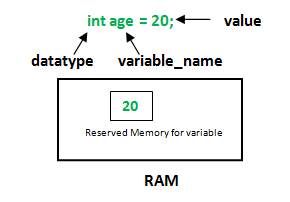定义变量时如何避免编译错误
变量:变量是赋予内存位置的名称。它是程序中存储的基本单位。
- 存储在变量中的值可以在程序执行期间更改。
- 变量只是内存位置的名称,对变量执行的所有操作都会影响该内存位置。
- 所有变量必须在使用前声明。
如何声明变量?
我们可以用通用语言(如 C、C++、 Java等)声明变量,如下所示: 
where:
datatype: Type of data that can be stored in this variable.
variable_name: Name given to the variable.
value: It is the initial value stored in the variable.
创建变量时如何避免错误?
- 标识符未声明:在任何编程语言中,所有变量都必须在使用前声明。如果您尝试使用尚未声明的此类名称,则会出现“未声明的标识符”编译错误。
例子:
#includeint main() { printf("%d", x); return 0; } 编译错误:
prog.c: In function 'main': prog.c:5:18: error: 'x' undeclared (first use in this function) printf("%d", x); ^ prog.c:5:18: note: each undeclared identifier is reported only once for each function it appears in - No initial value is given to the variable :此错误通常发生在变量已声明但未初始化时。这意味着创建了变量,但没有赋予它任何值。因此它将采用默认值。但是在 C 语言中,这可能会导致错误,因为该变量可以将垃圾值(或 0)作为其默认值。在其他语言中,0 将是其默认值。
例子:
#includeint main() { int x; printf("%d", x); return 0; } 输出:
0 - 在其范围之外使用变量:变量的范围是程序中可以访问变量的部分。与 C/C++ 一样,在Java中,所有标识符都是词法(或静态)范围的,变量的 ie 范围可以在编译时确定并且独立于函数调用堆栈。
例子:
#includeint main() { { int x = 5; } printf("%d", x); return 0; } 编译错误:
prog.c: In function 'main': prog.c:5:18: error: 'x' undeclared (first use in this function) printf("%d", x); ^ prog.c:5:18: note: each undeclared identifier is reported only once for each function it appears in如何更正上述代码:在外部作用域中使用之前声明变量 x。或者您可以在自己的范围内使用已经定义的变量 x
例子:
#includeint main() { { int x = 5; printf("%d", x); } return 0; } 输出:
5 - 创建具有不正确值类型的变量:这是由于值被隐式或显式转换为另一种类型的事实。有时这会导致警告或错误。
例子:
#includeint main() { char* x; int i = x; printf("%d", x); return 0; } 警告:
prog.c: In function 'main': prog.c:7:13: warning: initialization makes integer from pointer without a cast [-Wint-conversion] int i = x; ^